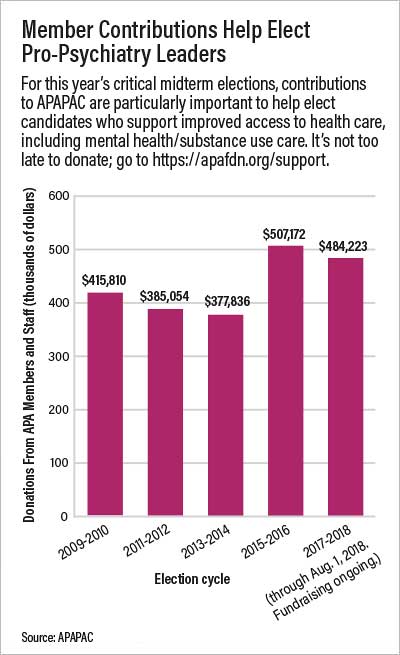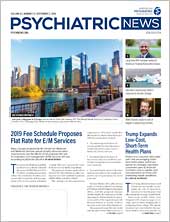With so many congressional seats up for grabs this November, APA’s political action committee (APAPAC) is working behind the scenes to shape the outcomes in a number of critical federal races.
There are 35 U.S. Senate and 435 House seats up for reelection, with as many as 55 of them considered toss-ups that could be won by either candidate.
What role does APAPAC play? Put simply, it seeks out viable candidates who are supportive of psychiatry, cultivates relationships with them, and helps them get elected to federal office. The goal is to build champions for psychiatry in Congress.
Some of the issues APAPAC works to advance include improving patient access to psychiatrists, fighting for funding for mental health programs and research, and treating the opioid epidemic. Another major concern is ramping up the psychiatry workforce by securing more residencies for medical students.
“We provide support to candidates who are pro mental health and who are interested in championing our issues: promoting access to high-quality, evidence-based psychiatric care and in promoting psychiatry overall,” said child and adolescent psychiatrist Debra Koss, M.D., a member of APA’s Council on Advocacy and Government Relations and APAPAC consultant. Koss said that through her work with APAPAC, she has been able to share anecdotes of her clinical experiences and patients’ attempts to access care with lawmakers. “These are much more compelling to lawmakers than mere statistics,” Koss added.
“Historically, psychiatry is near the bottom of the pack of physician specialties in terms of money raised to support candidates, but that is gradually changing as APA members recognize its importance,” said APAPAC Director Ashley Mild. “We are gaining strength. With nearly $485,000 raised from members so far through August 1, we’re on track to exceed our 2016 election cycle fundraising numbers.”
With the midterm elections just around the corner, the future of mental health policy may hang in the balance. APAPAC has contributed to 111 congressional races so far in the 2017-2018 election cycle.
Mental health issues are bipartisan, so APAPAC supports legislators on both sides of the aisle. “We may not agree with the legislators’ opinions on every single topic, but when we advocate through the PAC, our focus is on mental health, and on those issues, we align,” Koss explained.
Helping to overcome the stigma against psychiatry and mental illness is another role of APAPAC. “People have the idea that treatment doesn’t work. They see homeless people on the street or read a headline about a tragic shooting,” said APAPAC Chair R. Scott Benson, M.D., a child and adolescent psychiatrist in Pensacola, Fla. Benson noted that many patients he sees respond to treatment and go on to live healthy lives.
APAPAC aims to educate lawmakers on the realities of mental illness and the importance of providing resources to care. The group also works with legislators to block legislation that would be detrimental for psychiatrists and their patients, Benson said. For instance, whenever a mass shooting happens, a lawmaker floats the idea of creating a mass database of every psychiatric patient—to track them or make sure they don’t own guns. “That would be an invasion of privacy,” he said. “The people making these decisions are not necessarily psychiatrists, so we need that voice in the legislative process.”
Koss, who has spent more than a decade working in political advocacy for mental health, explained what keeps her involved: “I realized it’s a way to have a direct impact on legislation that affects our patients and affects our profession. There are many special interest groups out there meeting with legislators, trying to sway their thinking on issues. That’s why it’s imperative that we as psychiatrists remain committed to the process of advocacy and on building relationships with our lawmakers. At the same time, it’s important that we contribute to the APAPAC.”
Benson echoed that sentiment. “We as citizens and psychiatrists have to recognize that much as we dislike it, elections run on money.” ■
Members can make contributions to the APAPAC
here.

